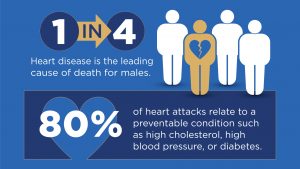On average, men in the United States die about six years younger than women. A man’s life expectancy is 74.8 years, while a woman’s is 80.2 years. This June, one of the goals of Men’s Health Month is to reduce this gap in lifespan.
But how? One way is to identify the causes of premature death and take steps to prevent them. As the proverb goes, “An ounce of prevention is worth a pound of cure.” With that in mind, let’s take a look at some of the leading health problems faced by men, and then let’s talk about how to prevent them.
1. Cardiovascular Disease
Cardiovascular disease is a broad term that encompasses several conditions of the heart and blood vessels, including heart attack, stroke, heart failure, and others. It is the leading cause of death globally, taking nearly 18 million lives every year. Cardiovascular disease is particularly concerning for men, who develop it 10 to 15 years earlier than women, on average.
Nearly 24% of male deaths in the United States are caused by heart disease, and an additional 4% are caused by stroke. This means cardiovascular disease accounts for at least 1 in 4 male deaths. More concerning is that one quarter of all heart-disease-related deaths occur in men ages 35-65 — many years shy of the average life expectancy.
Causes of cardiovascular disease can be genetic, but many are related to lifestyle choices such as unhealthy dieting, limited physical activity, tobacco use and excessive alcohol consumption.
2. Cancer
Cancer is the second leading cause of death in men, responsible for approximately 22% of male deaths in the United States. The most common forms of cancer for men are lung, prostate, and colorectal cancer.
-
Lung cancer is the leading cause of cancer death worldwide, for both men and women. Nearly all (90%) of lung cancer cases are caused by smoking cigarettes or exposure to secondhand smoke. If lung cancer is detected early, it is usually treatable; however, it often shows few or no symptoms in early stages.
-
Prostate cancer, which begins in the prostate gland of the male reproductive system, affects about 1 in 8 men in the United States. It is usually diagnosed in men aged 65 or older, and those who have a father or brother with prostate cancer are at twice the risk of developing the disease.
-
Colorectal cancer affects the colon or rectum, two parts of the large intestine. Men are diagnosed slightly more often than women — lifetime risk of developing colorectal cancer is about 1 in 23 for men and 1 in 25 for women. Risk increases with age, but also from smoking, drinking alcohol, and obesity.

Dr. David Boyce, Radiation Oncologist (Richard E. Winter Cancer Center)
“Prostate cancer is the most common cancer diagnosed in men,” says Dr. David Boyce, Claxton-Hepburn Medical Center. ”Early detection is very important in the battle against prostate cancer as when it is caught early, excellent cure rates can be achieved. Men over the age of 55 should discuss prostate screening options with their primary care providers in order to develop a personalized approach to risk stratification and early detection.”
3. Chronic Lower Respiratory Diseases
Chronic lower respiratory diseases are a group of disorders that impact the lungs and airways. They include chronic obstructive pulmonary disease (COPD), asthma, emphysema and chronic bronchitis. These conditions cause about 5% of all male deaths in the United States despite being largely preventable — at least 80% of cases are caused by cigarette smoking.
4.Diabetes
Diabetes is a chronic disease that occurs when the pancreas does not produce enough insulin, a hormone that regulates blood-glucose levels. This causes too much sugar in the blood, which can damage many of the body’s systems, such as nerves and blood vessels, over time. In the United States, diabetes is more prevalent in men, with 12.6% diagnosed compared to 10.2% of women.
About 9 out of 10 people with diabetes have type 2 diabetes, which can be caused by genetics or age, but is most closely linked to obesity, poor diet and lack of physical activity. Those with type 2 diabetes are at high risk for developing other health conditions, including cardiovascular disease, kidney disease and depression.
5. Mental Health Issues
Men and women are both affected by mental health issues. Some disorders affect men more than women, and vice versa. However, men die by suicide nearly four times as often as women, which is a statistic as complicated to unpack as it is startling.
There are many factors at play in men’s mental health. Men are less likely than women to seek mental health care when they need it, but they also face societal and generational barriers in doing so. Men’s symptoms of depression and anxiety may be different from women’s, and thus may be under- or misdiagnosed. According to Mental Health America, 6 million American men experience depression each year, but many are undiagnosed.
An Ounce of Prevention…
Here’s the good news: there are several things men can do to prevent these conditions and live healthier, potentially longer, lives. The even better news? By making some of the lifestyle choices below, men can reduce their risk for all of the above conditions at the same time. Talk about multi-tasking!
-
Eat a Healthy Diet: Follow a balanced diet rich in fruits, vegetables, whole grains, lean proteins, and healthy fats. Limit saturated fats, trans fats, cholesterol, sodium, and added sugars.
-
Exercise Regularly: Adult men should get at least 150 minutes of moderate-intensity exercise or 75 minutes of vigorous exercise each week, along with muscle-strengthening activities on two or more days per week.
-
Maintain a Healthy Weight: Being overweight or obese increases the risk of cardiovascular disease, cancer, diabetes and depression. Achieve and maintain a healthy weight through a combination of diet and exercise.
-
Quit Smoking, or Never Start: Smoking damages blood vessels, raises blood pressure, and increases the risk of heart disease, lung cancer and respiratory disease. As soon as you quit smoking, your risk for these conditions begins to drop.
-
Limit Alcohol: Adult men should limit alcohol intake to no more than two drinks per day.
-
Manage Stress: Chronic stress can contribute to numerous physical and mental health problems. Practice stress-reduction techniques such as meditation, yoga, or hobbies that you enjoy.
Support is Available at Carthage Area Hospital
In addition to making healthy lifestyle choices, men should visit their primary care provider regularly for check-ups and screenings to assess their risk for common health problems.
Carthage Area Hospital’s primary care physicians provide a range of services to North Country residents. Their services are founded on relationships and are tailored to the unique individuals they work with. Among the many primary care services provides are:
-
Wellness Visits and Screenings: Through routine checkups and screenings, our physicians can monitor your health, keep track of existing conditions, and alert you to changes.
-
Preventive Care: Health monitoring is essential for preventive care. We’ll work with you to keep you healthy and safe from serious illnesses and conditions.
-
Non-Emergency Illness: If you have a mild fever, earache, or cough, your primary care physician is the person you’ll call upon to help identify the cause.
-
Specialist Referrals: If an illness is beyond the scope of general practice, our physicians can write a referral and coordinate treatments across multiple specialties.
-
Health Questions: Our primary care physicians can answer your health questions and alleviate your concerns.



